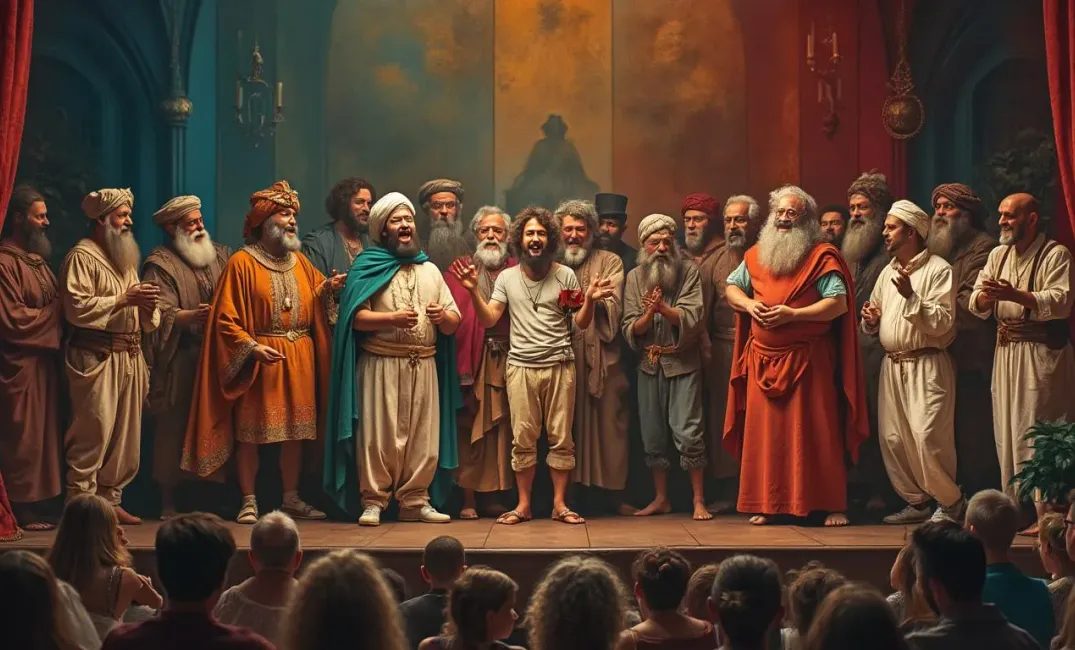Introduction: The Infectious Power of Laughter
“Laughter is the shortest distance between two people.” — Victor Borge
Laughter’s resonance has echoed through the corridors of human history, serving as a universal language that transcends culture and time. Comedy, through its various forms, captures the human capacity for imagination, critique, resilience, and joy. From the satirical verses of Ancient Greece to the stand-up routines of modern times, comedy’s evolution is intertwined with societal changes, reflecting reality and challenging it. This exploration into human comedy delves into its historical roots, societal impacts, and enduring legacy.
The Historical Tapestry of Comedy
Ancient and Classical Comedy
- Ancient Greek Origins: In Ancient Greece, Aristophanes pioneered comedic plays that combined satire, political commentary, and societal reflection. Their impact laid the foundations for comedic genres, influencing performance art for millennia.
- Roman Innovations: Roman playwrights such as Plautus and Terence advanced comedic art with complex characters and plots that revolved around mistaken identities and societal satire, illustrating cultural dynamics within the empire.
Medieval and Renaissance Humour
- Jesters and Buffoons: During the Middle Ages, jesters entertained courts with humor that often masked social critiques. Their role as 'fools' allowed freedom to mock authority and societal norms.
- Shakespeare’s Wit: The Renaissance heralded a new era of comedy with Shakespeare’s plays masterfully intertwining humor, wit, and pathos, reflecting the complexities of human experience and societal hierarchies.
The Cultural and Societal Functions of Comedy
A Mirror to Society
- Satire and Social Critique: Comedy serves as a powerful vehicle for satire, unveiling societal flaws, challenging the status quo, and advocating reform through humor.
- Breaking Taboos: By addressing taboo subjects with levity, comedy fosters dialogue and reflection, promoting cultural evolution and understanding.
Unity and Connection
- Cross-Cultural Resonance: Humour’s universality bridges cultural divides, facilitating understanding and empathy among diverse groups.
- Collective Healing: Comedy offers solace during challenging times, enabling societies to confront adversity with resilience while nurturing collective healing and psychological relief.
Evolution of Contemporary Comedy
The Rise of Stand-Up
- Pioneers and Innovators: Figures like Lenny Bruce, Richard Pryor, and George Carlin revolutionized stand-up comedy by addressing controversial topics head-on, challenging prejudices and societal injustices.
- Diversity and Inclusion: Today's comedians explore a broad spectrum of perspectives, drawing from diverse backgrounds to address race, gender, and identity, reflecting evolving cultural discourses.
Comedy in the Digital Age
- Online Platforms and Virality: The internet has reshaped comedy dissemination, with platforms like YouTube and social media enabling comedians to reach global audiences instantaneously, democratizing humor.
- Memes and Micro-Comedy: Digital culture has spawned micro-comedy forms such as memes and TikTok videos, reflecting and shaping societal trends with brevity and wit.
The Role of Comedy in Modern Society
Challenging Power Structures
- Political Satire: Show like The Daily Show and Last Week Tonight illustrate how comedy wields influence, critiquing and holding power accountable, making complex issues more accessible to the public.
- Advocacy and Awareness: Comedy’s ability to illuminate social issues fosters awareness and engagement, often serving as a catalyst for movements advocating change and justice.
Psychological and Emotional Impact
- Laughter as Medicine: Studies underscore the benefits of laughter for mental health, highlighting its role in reducing stress, anxiety, and depressive symptoms, fostering individual and collective well-being.
- Building Resilience: By reinforcing a sense of humor, individuals and communities bolster their resilience to life’s challenges, cultivating an adaptive mindset.
Challenges and Ethical Boundaries in Comedy
Navigating Sensitivity and Offense
- Censorship and Free Speech: Comedians often straddle the fine line between free expression and offense, navigating societal shifts in tolerance and sensitivity.
- Ethical Considerations: The evolution of cultural and social awareness necessitates ethical reflections concerning the limits of humor and responsibility toward diverse communities.
Balancing Tradition and Innovation
- Honoring Legacy: While comedy evolves, it simultaneously honors traditional comedic practices, ensuring that historical forms and influences remain appreciated and incorporated into modern acts.
- Innovation in Material and Medium: Innovators must continuously adapt material to reflect contemporary issues and utilize emerging platforms, ensuring continued relevance and creativity.
Conclusion: Laughter as a Timeless Companion
"A day without laughter is a day wasted." — Charlie Chaplin
Comedy is a testament to human ingenuity, courage, and spirit. It offers not only reflections of society’s realities but also the possibility for transformation and understanding. In comedy’s timeless narratives and performances, humanity finds both a mirror and a light—a way to confront darkness with humor and hope.
Through laughter, humanity forges connections that traverse time and space, capable of healing, enlightening, and unifying diverse cultures. As societies evolve, embracing comedy's nuanced potentials while respecting ethical boundaries ensures that its legacy endures, enriching the human experience with joy, introspection, and the perpetual reminder of our shared humanity. By appreciating and nurturing comedy's role in society, future generations inherit a dynamic tool for reflection, unity, and innovation on their journeys through an ever-changing world.
COMEDY, RESILIENCE, CULTURE, STAND-UP, SOCIETY, ETHICAL BOUNDARIES, HISTORY, SATIRE, DIGITAL AGE, LAUGHTER

